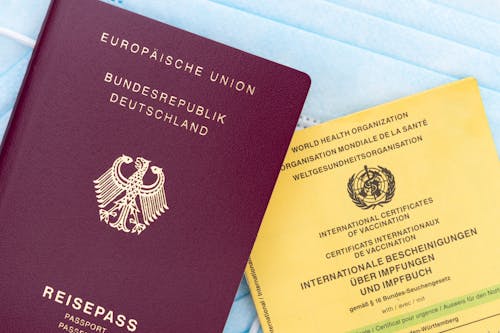People living in Europe will be required to use two passports whenever they want to travel.
The purpose of the certificate is to allow travel within the continent, without restrictions, for all people who have been vaccinated against Covid-19, who have recently been tested and found to be free of the virus and those who have survived the disease.
It is known as the "European Vaccine Passport" and is recognized by all 27 EU member states and other nations such as Iceland, Norway and Switzerland.
"We want to help member states restore without fear of freedom of movement," European Commission President Ursula Von der Leyen said in launching the initiative.
However, the vaccination passport proposal was opposed by some states amid concerns that it could be used as discriminatory tools.
Responding to the motion, European Commission officials stated that they want to control any citizens who for one reason or another have not been vaccinated.
The EU has indicated that the move is intended to guarantee citizens and residents of the union freedom of movement.
However, countries like Germany and Spain have already relaxed travel restrictions outside the EU.
How does this passport work and how will it affect travelers?
1. What is EUDCC?
Here are the criteria considered before approving this digital certificate:
It is used by all citizens of the European Union (EU).
It confirms the vaccine or specific tests that indicate the user has no Covid-19 or has recently recovered from an infection (within the last 180 days).
It is supplied in digital format with paper.
All designs include a QR code to ensure the validity of the certificate.
It will also contain important information, meaning it will protect the personal information of the subject.
It will be published in the official language or languages of the countries that offer it in addition to English.
It will be provided free of charge.
Any member state that will allow vaccinated travelers to avoid conditions (such as stay in quarantine) must accept certificates from other EU countries subject to similar conditions.
The European Union has so far approved the vaccines of Pfizer-BioNTech, Moderna, Oxford-AstraZeneca and Johnson & Johnson, but the Russian vaccines Sputnik V and the Chinese vaccines Sinovac and Sinopharm have not yet been approved.
The Oxford-AstraZeneca vaccine made in India, known as Covishield, is also not included in the EUDCC program.
A measure that will affect many travelers from Asia and Africa, the vaccine developed by the Indian Serum Institute, has been widely used.
But the proposal adds that member states have been given a decision on whether to accept immunization certificates approved by the World Health Organization (WHO), as was the case with the Covishield vaccine.
Seven EU countries (Spain, Germany, Slovenia, Greece, Ireland, Austria and Estonia) - along with Iceland and Switzerland - have approved Covishield for arriving travelers, sources told the BBC last Thursday.
China's most widely used vaccines in the world (in 61 different countries), have been approved by the WHO for emergency use.
The Russian Sputnik V vaccine has not yet received WHO approval. However, a country like Greece has included it in its list of conditions for entry into the country.
Tags:
COVID-19


